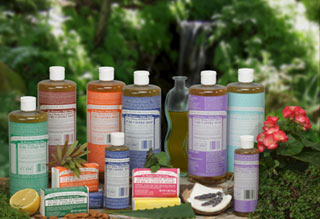Conscious care: personal care products without GMOs
By Arianne Pfoutz
Published: April 30, 2013
Category: Non-GMO Ingredients

More personal care products such as Dr. Bronner’s soaps are being Non-GMO Project verified.
To access all the articles in this month's issue of The Organic & Non-GMO Report, SUBSCRIBE NOW.
“Non-GMO” becomes new gold standard for the industry
There’s a revolution going on in the personal care product industry. Andalou Naturals calls it “Beauty in Action” – creating mindful, effective products good for people and the planet. Avalon Organics refers to “Conscious Cosmetics”—ones inherently pure, safe, and full of health benefits. EO’s “Love Life. Live Clean.” inspires consumers to enjoy products made responsibly, sustainably, and authentically.
As personal care products aim for increasingly high standards for non-toxicity, sustainability, and nutrition, it’s not surprising industry leaders are going for non-GMO verification as a way to instill consumer confidence. In fact, personal care is the fastest growing non-food category for non-GMO products. The Non-GMO Project “label with the orange butterfly” is becoming ubiquitous, on body care as well as food shelves.
“Help set new standard for personal care”
Andalou Naturals, manufacturer of natural skin and hair care, is the first personal care brand to have its entire line of products achieve Non-GMO Project verification, in January 2013.
“Andalou Naturals is committed to the consumer’s right to know what’s in their products,” said CEO Stacey Egide. “Partnering with the Non-GMO Project was consistent with our brand standard to use natural and organic ingredients that are safe for our consumers and the environment.”
It was an ambitious endeavor, with over 200 ingredients requiring research. The full team effort involved cooperation from manufacturers and suppliers to confirm not only that source ingredients were non-GMO but also that the manufacturing process did not include GMOs—transparency from farm to shelf. A total of 66 products have been verified.
GM risks for cosmetics include alcohol and glycerin (corn derivatives), and soy and canola oils.
“We decided to lead by example and help set a new standard for personal care,” said Alissa Berihu, formulator for Andalou Naturals.
“Our retail partners are excited about our verification,” said Stacey. “They see it as another step in the evolution of our industry. Consumer response has also been great.”
“Builds trust for consumer”
EO, a leading essential oil-based personal care products company, was the very first body care company to receive Non-GMO certification, in October 2011. A family-owned, certified organic manufacturer, EO offers over 250 therapeutic body care products. The company develops its own signature essential oil blends and sources its own ingredients.
Founded in 1995 by Brad Black and Susan Griffin Black, EO joined the Non-GMO Project because it “supports all the values we support,” Susan said. “From our beginning, we’ve always valued standards of integrity, trust, and effective product, and being transparent to our consumers. Joining the Project gave us peace of mind, and it builds trust for the consumer.”
EO has verified as many products as it can, and Susan admits the process is expensive and extensive.
“It’s labor-intensive, getting information for each ingredient—examining how they are processed, and percentages. Alcohol, used in our sanitizers, can easily come from GM corn, so we buy organic sugar-based alcohol. The process is rigorous, meticulous, and it takes time, money, and then someone to maintain the standards—but it’s the only way to be sure.”
Dr. Bronner’s, maker of certified Organic and Fair Trade liquid and bar soaps and personal care products, joined the Non-GMO Project to lend its credibility and help sustain the movement for the Right to Know; Dr. Bronner’s spearheaded the 2011 march to Washington to spread the push for GM labeling.
“It’s a way to strengthen support for what the government isn’t doing,” said Adam Eidinger, public affairs director. “If you’re part of the Non-GMO Project, you’re seen as ‘conscious’ and ‘engaged,’ and it puts pressure on large companies to address this issue. And non-GMO is a value people are willing to pay for.”
“Important for us to be ‘on the side of right’”
Sunfood Superfoods, a leading supplier of high-quality superfoods, has been certified organic since 1995. The majority of their products (over 50) have been verified by the Non-GMO Project: from almonds and dates to cacao butter and Maqui berries. Joining the Non-GMO project was a way “to make official” their non-GMO commitment and add to the consumer’s trust while increasing their awareness of the issue.
Three personal body care essentials have been verified: shea butter, coconut oil, and cacao butter. “It’s a long process, going through the entire supply chain from source through manufacturing,” said Rick Blair of client services. “But it’s important for us to be ‘on the side of right.’ Organic standards are not as high in the US as in Europe, in general, and the Non-GMO Project goes a step beyond. It’s more stringent and involved than certification from the National Organic Program.”
Sunfood has several supplements in the queue for verification.
Supporting the Non-GMO Project is also a way for these companies to engage in the ongoing GM labeling initiatives and actively push for the Right to Know. They see the shared vision, everyone’s on board . . .and the train is gaining momentum.
© Copyright The Organic & Non-GMO Report, May 2013




